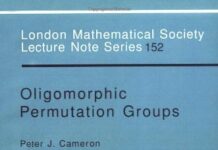
Ebook Info
- Published: 1998
- Number of pages: 192 pages
- Format: PDF
- File Size: 7.21 MB
- Authors: Peter J. Cameron
Description
Set theory, logic and category theory lie at the foundations of mathematics, and have a dramatic effect on the mathematics that we do, through the Axiom of Choice, Gödel’s Theorem, and the Skolem Paradox. But they are also rich mathematical theories in their own right, contributing techniques and results to working mathematicians such as the Compactness Theorem and module categories. The book is aimed at those who know some mathematics and want to know more about its building blocks. Set theory is first treated naively an axiomatic treatment is given after the basics of first-order logic have been introduced. The discussion is su pported by a wide range of exercises. The final chapter touches on philosophical issues. The book is supported by a World Wibe Web site containing a variety of supplementary material.
User’s Reviews
Reviews from Amazon users which were colected at the time this book was published on the website:
⭐Excellent textbook on sets and mathematical logic for the senior undergraduate or beginning graduate student (although not much on categories here). I have repeatedly adopted this as a textbook and recommended it to others. Yes, it is a lighter introduction than some–this is what attracts me to it. I find it unusual and refreshing to be able to cover an entire textbook in one semester, while still having time supplement the book with additional topics of my personal choice (such as the hyperreals and higher categories). Despite its brevity and informal tone, there are no gaping holes in the presentation; in fact Cameron attends to certain proof details of the most basic theorems that other authors either omit or seem not to recognize. In response to another reviewer, I would say that if what you really want is recursion theory, get a theoretical computer science book instead.
⭐Having purchased this text (as part of the Springer Undergraduate Mathematics Series), I expected a decent publication. I had purchased and used their Number Theory text (Jones & Jones) and I was satisfied with the overal quality of the problem sets and the exposition.Like all the SUMS texts, this book provides the solutions (in this case selected solutions and the link to the website that has the rest) for all the excercises found in this textbook. However, in this case, the excercises are much to trivial to be considered a good workout in any of the topics covered in this book.To account briefly book covers Naive Set Theory, Sentential Logic, 1st Order Predicate Calculus, “Model Theory” (I’ll explain the quote later), Ordinal numbers, Aximoatic Set Theory, and Category Theory.Topics that are missing in a introductory treatment includes Recursion Theory, most of even the basic developments of Model Theory.This would be fine in it of itself, however, what the text does cover, namely the 1st order Predicate Caculus and Model Theory, is so sparing that one gets a very tiny glimpse of the subject and that is it.For a SUMS text, the book is suprisingly lacking in rigor and substance. Theorems are still stated and proved yet nothing but the most basic results are displayed. For instance, in 1st order predicate calculus the book introduces the Deduction theorem then right after goes to Soundness and then Completeness.It seems the topics of symbol substitutibility, Henkin langauge expansion, and quantifier elemination were totally ommited. These are very important topics, topics no introduction to Mathematical logic should be without, yet they are absent in this text.Further, the chapter on Model Theory is nothing but theorem throwing at the reader. In the 2nd page and little bit after, the reader is introduced to Lowenheim-Skolem Theorem, Compactness, Consistency and a very brief expostion on a Peano Arithemtic system.This chapter also serves as a brief introduction to incompleteness (perhaps a page introduction at most). But to be honest, even the proofs given for these thoerems are lacking and wouldn’t satisfy many students of this subject as a suffecient explanation (let alone a potential refrence).To demonstrate the unbelievable terseness (and sheer lacking) of this exposition, the book discusses everything on Godel numbers to incompleteness in a span of 3 – 4 pages. Even in “light” introductions, such as Enderton, this development and the accompanying machinary requires an entire chapter to develop (and Cameron has ommited a signifcent amount of the machianry by ommited all of Recursion theory).The good in this book or perhaps more accurately, the unqiue, are that it does give an introduction to ordinals (usually reserved for Intro. Set Theory books) and a light introduction to Category Theory (“preview” is more fitting for that chapter).In fact, “Preview” is a very fitting description of this textbook in general. This text cannot hope to serve as anything more then a preview for the subject discussed within those pages. People who wish to develop a working knowledge of this subject should look towards Enderton as a “lighter” introduction (if Enderton is a diet Coke, then this book is certainly water).I think this text would go well in two scenarios. One, a indivudal who is about to take his firs FOM course and uses this book as a preview durring the summer (or Winter break) before actually taking the course. The second scenario would be to use this text as a followup with Springer’s other text Johnson’s “Elements of Logic via Numbers and Sets.” That text combined with this would serve as a very good “bridge” course to abstract mathematics.If, however, you are not one of the above mentioned, then I recommend that you consider purchsing one of hte other more establisehd text on Mathematical logic as this book is to light (and in my opinoin to expensive for the amount of material given) to serve as a useful text. Thus, this book may fail totatlly as a textbook for a intro. FOM course, however it can still find some use as a advanced preview for the subject or a companion in a abstract matheamtics bridge course.
Keywords
Free Download Sets, Logic and Categories (Springer Undergraduate Mathematics Series) 1998th Edition in PDF format
Sets, Logic and Categories (Springer Undergraduate Mathematics Series) 1998th Edition PDF Free Download
Download Sets, Logic and Categories (Springer Undergraduate Mathematics Series) 1998th Edition 1998 PDF Free
Sets, Logic and Categories (Springer Undergraduate Mathematics Series) 1998th Edition 1998 PDF Free Download
Download Sets, Logic and Categories (Springer Undergraduate Mathematics Series) 1998th Edition PDF
Free Download Ebook Sets, Logic and Categories (Springer Undergraduate Mathematics Series) 1998th Edition





